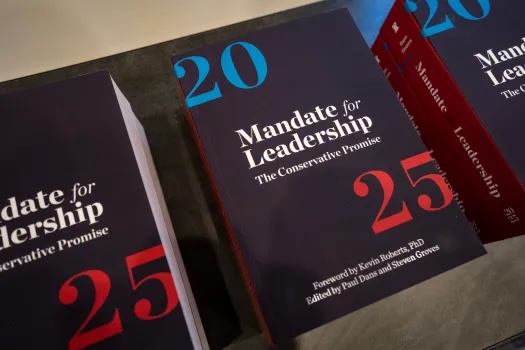Antonio Ray Harvey – California Black MEdia Network
(CBM) – With the general elections just a few days away, Black organizations and leaders, including Rep. Maxine Waters (D-CA-43), are sounding the alarm about Project 2025, the Heritage Foundation’s controversial “policy bible.”
The four-pillar initiative includes a detailed blueprint for the next conservative presidential administration – making way for a sweeping overhaul of the executive branch.
Waters has been outspoken in her opposition of the 900-page policy.
Recently, she shared “The People’s Guide to Project 2025” with the Inglewood Area Ministers Association, an organization of predominantly Black pastors, to inform them about the proposal’s impact, emphasizing that its influence would reach beyond the traditional spheres of presidential power. The 15-term politician from Los Angeles shared her sentiments with the House Financial Services Committee in July.
“Project 2025 promotes radical ideals to materially undermine the Federal Reserve, if not effectively abolish it,” Waters said.

Written by the Heritage Foundation, Project 2025 was developed with the input of a broad coalition of conservative organizations and is organized around four pillars: Policy, Personnel, Training, and the 180-Day Playbook. The proposals in the document aim to revamp every aspect of the U.S. government.
Language on Project 2025’s website states, “It is not enough for conservatives to win elections. If we are going to rescue the country from the grip of the radical Left, we need both a governing agenda and the right people in place, ready to carry this agenda out on day one of the next conservative Administration.”
Waters is not the only person sounding the alarm about Project 2025’s agenda. Grassroot organizations in California and across the nation are preparing to combat the initiative despite who wins the election between Trump and U.S. Vice President Kamala Harris.
The National Assembly of American Slavery Descendants (NAASD), members of advocacy groups in California, and other Black political organizations across the nation are drawing up policy documents to counter the conservative Project 2025 initiative.
On Aug. 2, NAASD hosted a nationwide ZOOM conference call to discuss policies that concern Black communities. Nocola Hemphill, the president and chief executive officer of the U.S. Black Women’s Chamber, and grassroots organizations on the call are promoting what they call, #Reparations2025.
“I just want us to think about bringing all policies (ideas) together when we think about Project 2025,” said Hemphill, who lives in South Carolina. “I am excited about the possibility of us forming our own version of Project 2025 and having it published by the November election.”
NAASD is a nonprofit association of community activists from across the country that formed around May 2019. Its mission is to provide political education, community organizing, and mobilizing support for Reparations for Black American Descendants of U.S. Chattel Slavery.
The organization also trains advocates to understand the political process. The 90-minute virtual meeting was facilitated by NAASD members Mark Stevens, Nita Watson, and Najee Jahaan.
Los Angeles resident Khansa “Friday Jones” is the president of NAASD.
“The National Assembly of American Slavery Descendants (NAASD) envisions a nation where African American descendants of US slavery can fully exercise their constitutional citizenship rights and have economic agency for generations,” Muhammad told California Black Media (CBM).
In 2021, NAASD released the initial phase of its comprehensive R.E.P.A.I.R. Act policy platform titled “Priorities for Presidential Action.” The initiative is an acronym for Reconciliation, Equity, Protections, Atonement, Investment and Remuneration.
It is comprised of 12 legislative memos detailing “important and actionable measures to advanced reparative justice” for Black Americans in the United States, NAASD shared in an Aug. 3, 2021, written statement.
While forming an agenda for #Reparation2025, NAASD has created a survey to determine how systemic racism and discrimination in the United States have affected Black American lives and single out options to repair harms through public policy. Participants in the survey would help the organization shape a national blueprint.
“During this election cycle, it is imperative that national Black organizations come together for collective success,” Muhammad shared with CBM. “While the vote for President of the United States is important, we need to also focus on other active projects such as ‘Project 2025,’ Supreme Court rulings around race and more.”
Muhammad added, “NAASD’s Black experience survey allows for individuals, Black organizations, and their allies to forge a pathway to reparations by utilizing community-building and policy.”
The members of NAASD say that there are no right or wrong answers in taking the survey. The organization is only interested in survey takers to share experiences and opinions.
It takes approximately 10 minutes to complete this survey. The R.E.P.A.I.R. ACT infographic can be downloaded from the NAASD website.
“It is crucial that we share this survey far and wide so that together we can formulate demands for the first 100 days of the next presidential administration,” Muhammad said.